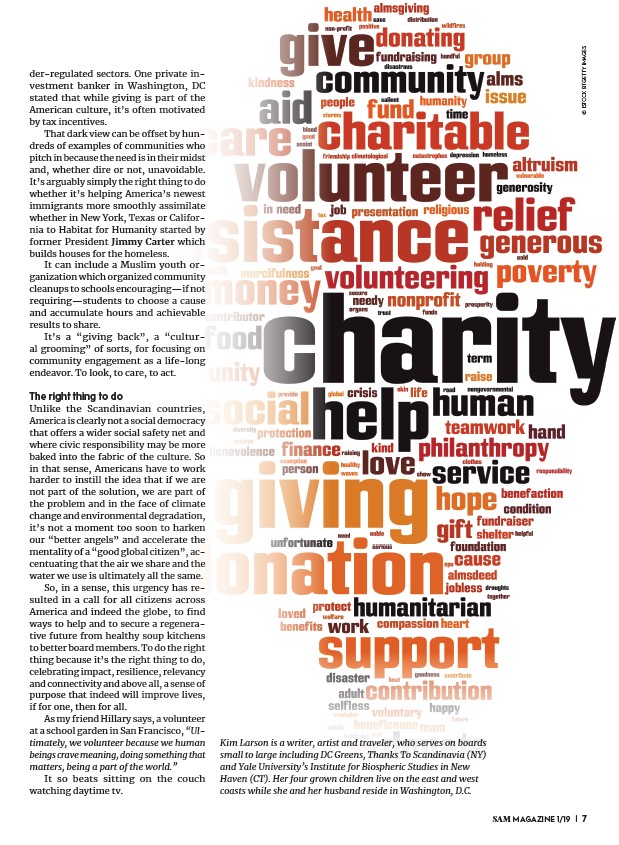
der-regulated sectors. One private investment
banker in Washington, DC
stated that while giving is part of the
American culture, it’s often motivated
by tax incentives.
That dark view can be offset by hundreds
of examples of communities who
pitch in because the need is in their midst
and, whether dire or not, unavoidable.
It’s arguably simply the right thing to do
whether it’s helping America’s newest
immigrants more smoothly assimilate
whether in New York, Texas or California
to Habitat for Humanity started by
former President Jimmy Carter which
builds houses for the homeless.
It can include a Muslim youth organization
which organized community
cleanups to schools encouraging—if not
requiring—students to choose a cause
and accumulate hours and achievable
results to share.
It’s a “giving back”, a “cultural
grooming” of sorts, for focusing on
community engagement as a life-long
endeavor. To look, to care, to act.
The right thing to do
Unlike the Scandinavian countries,
America is clearly not a social democracy
that offers a wider social safety net and
where civic responsibility may be more
baked into the fabric of the culture. So
in that sense, Americans have to work
harder to instill the idea that if we are
not part of the solution, we are part of
the problem and in the face of climate
change and environmental degradation,
it’s not a moment too soon to harken
our “better angels” and accelerate the
mentality of a “good global citizen”, accentuating
that the air we share and the
water we use is ultimately all the same.
So, in a sense, this urgency has resulted
in a call for all citizens across
America and indeed the globe, to find
ways to help and to secure a regenerative
future from healthy soup kitchens
to better board members. To do the right
thing because it’s the right thing to do,
celebrating impact, resilience, relevancy
and connectivity and above all, a sense of
purpose that indeed will improve lives,
if for one, then for all.
As my friend Hillary says, a volunteer
at a school garden in San Francisco, “Ultimately,
we volunteer because we human
beings crave meaning, doing something that
matters, being a part of the world.”
It so beats sitting on the couch
watching daytime tv.
Kim Larson is a writer, artist and traveler, who serves on boards
small to large including DC Greens, Thanks To Scandinavia (NY)
and Yale University’s Institute for Biospheric Studies in New
Haven (CT). Her four grown children live on the east and west
coasts while she and her husband reside in Washington, D.C.
© ISTOCK BT GETTY IMAGES
SAM MAGAZINE 1/19 | 7